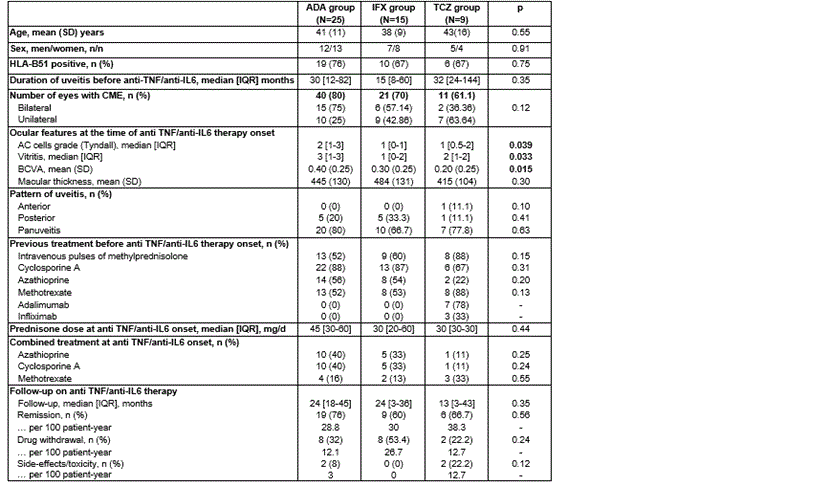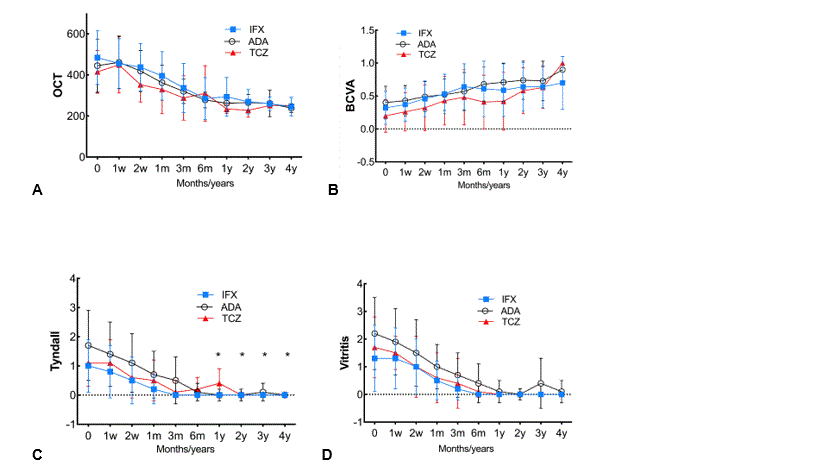Session Information
Date: Sunday, November 13, 2022
Title: Vasculitis – Non-ANCA-Associated and Related Disorders Poster II
Session Type: Poster Session C
Session Time: 1:00PM-3:00PM
Background/Purpose: To evaluate the efficacy of anti-TNF or anti-IL6 treatment in severe and refractory ocular involvement in patients with refractory cystoid macular edema (CME) due to Behçet’s disease (BD).
Methods: Multicenter study of patients with BD-associated ocular involvement refractory to immunosuppressive drugs. Patients with CME associated to BD uveitis were selected from a cohort of 177 patients treated with Infliximab (IFX) and/or Adalimumab (ADA) and 14 patients treated with Tocilizumab (TCZ). From baseline up to 4 years of follow-up, the evolution of macular thickness (main outcome), best-corrected visual acuity (BCVA) and intraocular inflammation (Tyndall and vitritis) was analyzed.
Results: A total of 49 patients with CME associated BD (and 72 eyes) were included. 25 patients (40 eyes) were treated with ADA, 15 patients (21 eyes) received IFX and 9 patients (11 eyes) were treated with TCZ. There was a lower basal BCVA in patients treated with TCZ. No statistically significant baseline differences were observed in the rest of parameters. Most patients from all groups had received several conventional immunosuppressive drugs and in addition, the group of TCZ had also received anti-TNF agents. Monotherapy with biological immunosuppressive drugs was used in 8 patients and combined therapy with conventional immunosuppressive drugs was used in 41 patients (Table 1). Regarding the evolution of ocular parameters after 1 year of treatment, macular thickness progressively decreased in the 3 groups, with no signs of CME. Similarly, visual acuity and inflammatory intraocular remission improved in all groups (Figure 1).
Conclusion: Refractory CME associated with BD uveitis can be effectively treated either with ADA, IFX or TCZ. Moreover, TCZ may be an appropriate therapeutic option for patients with contraindications or resistance to anti-TNF therapy.
To cite this abstract in AMA style:
Barroso-García N, Atienza-Mateo B, Ferraz Amaro I, Prieto-Peña D, De Vicente-Delmás A, Blanco R, González-Gay M. Anti-TNF versus Anti-IL6 Receptor Antagonist Therapy in Severe Ocular Involvement in Behçet’s Disease [abstract]. Arthritis Rheumatol. 2022; 74 (suppl 9). https://acrabstracts.org/abstract/anti-tnf-versus-anti-il6-receptor-antagonist-therapy-in-severe-ocular-involvement-in-behcets-disease/. Accessed .« Back to ACR Convergence 2022
ACR Meeting Abstracts - https://acrabstracts.org/abstract/anti-tnf-versus-anti-il6-receptor-antagonist-therapy-in-severe-ocular-involvement-in-behcets-disease/


